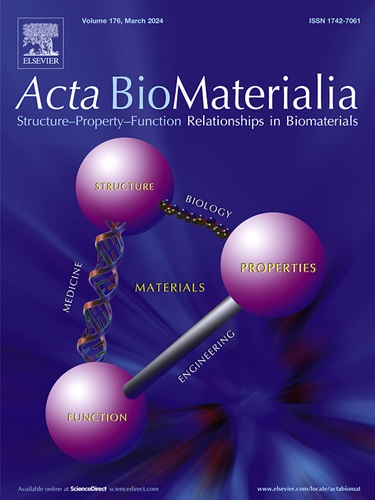基于细胞凋亡策略的纳米递送系统在类风湿关节炎强化治疗中的进展。
IF 9.4
1区 医学
Q1 ENGINEERING, BIOMEDICAL
引用次数: 0
摘要
类风湿性关节炎(RA)是一种慢性系统性自身免疫性疾病,主要特征为持续滑膜炎症和进行性骨侵蚀。RA的发病机制涉及一系列复杂的细胞和分子事件,包括巨噬细胞的持续过度活化、中性粒细胞的过度募集和活化、成纤维细胞样滑膜细胞(FLS)的病理性增殖和侵袭,以及破骨细胞(OCs)的分化和功能失调。这些失调细胞分泌的炎症因子通过多种病理机制显著破坏关节微环境,主要是通过促进滑膜炎症、软骨基质降解、破骨细胞介导的骨侵蚀和病理性血管生成。针对这些恶性细胞诱导凋亡的治疗策略在临床前研究中显示出相当大的潜力,提供了一种有希望的方法,通过同时减少炎症细胞因子的产生和抑制致病细胞增殖来提高治疗效果。然而,传统治疗药物毒副作用大,限制了临床应用。炎症诱导类风湿关节炎微环境(RAM)内细胞的形态和功能改变,特别是细胞膜上特异性受体的过度表达。这一现象推动了配体修饰的靶向纳米递送系统(nds)的发展,该系统可以特异性靶向并诱导特定细胞类型的凋亡,从而提高治疗效果。本文全面综述了基于凋亡策略的靶向nds治疗RA的研究进展,并详细讨论了其在诱导各种疾病相关细胞凋亡方面的优势。此外,还探讨了多种细胞类型联合凋亡治疗RA的可能性。这一综述有望提高对恶性细胞凋亡的认识,以加强RA的治疗。意义声明:本综述重点介绍了基于细胞凋亡策略的纳米递送系统(nds)在类风湿关节炎(RA)强化治疗中的最新进展。与传统的nds不同,这些优化的系统通过整合多种治疗策略,特异性地诱导RA微环境中恶性细胞的凋亡。通过总结最新的研究,我们的工作证明了这些nds通过靶向消除恶性细胞来抑制炎症反应和防止骨破坏的潜力,为RA的治疗提供了新的方向。本综述为研究人员和临床医生提供了一个全面的概述,促进了RA和其他慢性炎症性疾病更有效治疗方法的发展。本文章由计算机程序翻译,如有差异,请以英文原文为准。

Advances in nanodelivery systems based on apoptosis strategies for enhanced rheumatoid arthritis therapy
Rheumatoid arthritis (RA) is a chronic systemic autoimmune disorder primarily characterized by persistent synovial inflammation and progressive bone erosion. The pathogenesis of RA involves a complex cascade of cellular and molecular events, including sustained hyperactivation of macrophages, excessive recruitment and activation of neutrophils, pathological proliferation and invasion of fibroblast-like synoviocytes (FLS), and dysregulated differentiation and function of osteoclasts (OCs). The inflammatory factors secreted by these dysregulated cells significantly disrupt the joint microenvironment through multiple pathological mechanisms, primarily by promoting synovial inflammation, cartilage matrix degradation, osteoclast-mediated bone erosion, and pathological angiogenesis. Therapeutic strategies targeting the induction of apoptosis in these malignant cells have demonstrated considerable potential in preclinical studies, offering a promising approach to enhance treatment outcomes by simultaneously reducing inflammatory cytokine production and inhibiting pathogenic cell proliferation. However, conventional therapeutic drugs are limited in clinical applications because of their high toxicity and side effects. Inflammation induces morphological and functional changes in cells within the rheumatoid arthritis microenvironment (RAM), particularly the overexpression of specific receptors on cell membranes. This phenomenon has driven the development of ligand-modified targeted nanodelivery systems (NDSs), which can specifically target and induce apoptosis in specific cell types, thereby enhancing therapeutic efficacy. This paper comprehensively reviews the research progress of targeted NDSs based on apoptosis strategies for RA therapy, with a detailed discussion of their advantages in inducing apoptosis in various disease-associated cells. Furthermore, the potential of combining apoptosis of multiple cell types for RA treatment is explored. This review is expected to improve insights into the apoptosis of malignant cells to enhance RA therapy.
Statement of Significance
This review highlights recent advances in nanodelivery systems (NDSs) based on apoptotic strategies for enhanced rheumatoid arthritis (RA) therapy. Unlike conventional NDSs, these optimized systems specifically induce apoptosis in malignant cells within the RA microenvironment by integrating multiple therapeutic strategies. By summarizing the latest research, our work demonstrates the potential of these NDSs to suppress inflammatory responses and prevent bone destruction through targeted elimination of malignant cells, offering a novel direction for RA treatment. This review is significant as it provides a comprehensive overview for researchers and clinicians, facilitating the development of more effective therapeutic approaches for RA and other chronic inflammatory diseases.
求助全文
通过发布文献求助,成功后即可免费获取论文全文。
去求助
来源期刊

Acta Biomaterialia
工程技术-材料科学:生物材料
CiteScore
16.80
自引率
3.10%
发文量
776
审稿时长
30 days
期刊介绍:
Acta Biomaterialia is a monthly peer-reviewed scientific journal published by Elsevier. The journal was established in January 2005. The editor-in-chief is W.R. Wagner (University of Pittsburgh). The journal covers research in biomaterials science, including the interrelationship of biomaterial structure and function from macroscale to nanoscale. Topical coverage includes biomedical and biocompatible materials.
 求助内容:
求助内容: 应助结果提醒方式:
应助结果提醒方式:


